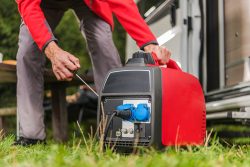Portable Generator Safety Tips
May 18, 2023 10:26 pm Leave your thoughts Portable Generator Safety Tips
Portable Generator Safety Tips
Portable generators are a great way to provide power when you need it the most, whether during an emergency power outage, a camping trip or a tailgate party. However, it’s crucial to keep safety in mind while operating a portable generator to avoid injuries, accidents and even death. In this blog post, we’ll discuss some critical portable generator safety tips that you need to consider before starting your portable generator.
1. Read the user manual
The first and foremost tip for safe portable generator operation is to read the user manual that comes with it. The user manual will provide all the necessary information that you need to know about the generator’s operation, safety precautions, and maintenance. The user manual will also help you understand the different parts of the generator, like the fuel tank, air filters, and exhaust system.
2. Place the generator carefully
Before setting up the generator, make sure to choose a safe location away from any flammable materials. The generator should be at least 20 feet away from your home to keep carbon monoxide (CO) from entering your home. Also, ensure that the generator is placed in a dry area to avoid any electrical shocks or short circuits.
3. Do not overload the generator
Each portable generator comes with a rated load capacity that you must adhere to. Overloading the generator is highly dangerous, as it can cause damage to the generator itself, or worse, cause a fire or explosion. Therefore, check the load capacity before plugging in any electrical devices and ensure that you don’t exceed the limit.
4. Keep the generator dry
Portable generators are designed to work in harsh weather conditions, but it’s crucial to take precautions in case of rain or snow. When using a portable generator outside, make sure to cover it with a canopy to keep it dry. Also, ensure that the power outlets on the generator are covered to keep water from getting into them.
5. Use grounded extension cords
Using an extension cord that’s not grounded can cause electrical hazards, shock or even a fire. Ensure that you’re using grounded extension cords that are rated for the voltage and amperage of your generator. Also, avoid running extension cords through doors or windows, which could cause damage to the cord.
6. Use CO detectors
Portable generators are known to emit carbon monoxide (CO), a colorless and odorless gas that can cause serious health problems or even death. Therefore, it’s essential to install CO detectors in your home to alert you in case of a CO leak. Also, never operate a generator in an enclosed space like a garage, basement, or even a tent.
7. Turn the generator off before refueling
Refueling a hot portable generator is highly dangerous and can cause a fire or explosion. Before refueling, ensure that the generator is turned off, and it has cooled down to avoid any accidents. Also, make sure to store the fuel away from the generator in a safe, cool, and dry location.
8. Regular maintenance
Regular maintenance is essential to ensure that your portable generator remains in proper working condition. Maintenance tasks like changing oil, checking the air filter, and testing the battery should be done regularly. Also, ensure that the spark plugs are cleaned, and the generator’s exhaust system is free from any clogs, rust or damages.
9. Do not connect the generator directly to your home’s electrical system.
Connecting a portable generator directly to a home’s electrical system is highly dangerous and may cause electrocution to you or utility workers. Instead, use a transfer switch to connect the generator to the home’s electrical system. A transfer switch will automatically disconnect the home’s electrical system from the utility power when the generator is operational.
10. Turn off and store the generator properly.
After using the generator, turn it off and ensure that it’s cooled down before storing it. Also, ensure that the generator is stored in a cool, dry, and safe place. Do not store the generator with fuel in the tank or near any heat sources.
Final Thoughts
Portable generators are an excellent source of power when you need it the most. However, operating them safely is crucial to avoid injuries, accidents, and even death. Ensure that you read the user manual, place the generator carefully, don’t overload it, keep it dry, use grounded extension cords, use CO detectors, turn it off before refueling, do regular maintenance, don’t connect it directly to your home’s electrical system and store it properly. By following these tips, you will ensure a safe portable generator operation every time.
Categorised in: Portable Generators
This post was written by admin

 Portable Generator Safety Tips
Portable Generator Safety Tips